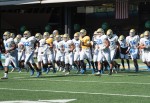Senate Bill 206 could be the great equalizer.
For years, there have been heated public debates about the financial compensation of collegiate athletes. People have argued about amateur status, scholarships, inter-sport equity, low-income exceptions and so on. But when the California State Senate threw in its two cents, everything came to a screeching halt.
SB 206 – also known as the Fair Pay to Play Act – proposed that collegiate athletes in the state of California would be able to sign with agents and sponsors, regaining the right to their own likeness and brand. The bill, proposed by Sen. Nancy Skinner, passed 31-4 in the Senate on May 22 and will now be passed on to the California State Assembly for further consideration.
If it passes, the bill would go into effect in 2023.
There is a lot of gray area and potential for corruption, as there always is – but this is undoubtedly a victory for athletes everywhere.
To athletes and third-party supporters who wanted player salaries, that was never going to happen. Like it or not, the salary for a scholarship athlete is the scholarship itself, and that will likely never change.
A lot of athletes – especially at UCLA – already get full rides along with access to beautiful facilities, room and board and cost-of-living stipends. Schools directly paying athletes additional money would be messy, unfair and the end of the NCAA.
Student-athletes have long claimed that being an NCAA athlete is like a job, and they are in fact compensated with those privileges the same way any employee would be compensated for their work.
But almost every other job on the planet lets you make money on the side. If you want to make $100 a month on a YouTube channel, sell your autograph for $25 or get paid $1,000 to be on a Subway billboard, you are free to do so.
And soon enough, NCAA athletes will be too – but only the ones in California.
SB 206 would prevent the NCAA from interfering with student-athlete income and also prevent the NCAA from punishing California schools that allow their athletes to be paid. There is a lot of progress to be made in the process, and the NCAA will undoubtedly stand its ground in court.
With the gray area still gray and consequences potentially on the horizon, the University of California and California State University systems – as well as Stanford and USC – are all opposed to the bill.
But their athletes, unsurprisingly, are not.
UCLA football’s Jay Shaw – a rising redshirt sophomore defensive back – tweeted in support of the bill. Rising sophomores defensive back Patrick Jolly, defensive lineman Tyler Manoa and linebacker Bo Calvert, among others, liked tweets about it as well.
https://twitter.com/js5_era/status/1131613761230389248
It is understandable why schools are hesitant to back the bill – there are already whispers of the NCAA excluding programs that allow their athletes to be paid.
But if it passes in the state Assembly, they likely won’t have a choice. The bill blocks California universities from enforcing NCAA policies that contradict SB 206, so UCLA, USC, Stanford and others might as well accept their fate sooner rather than later.
It is a compromise, but one that all sides should be content with.
Schools won’t have to pay athletes millions of additional dollars in fantastical salaries every year. Athletes will also be free to market themselves and maximize income based on their talent, which could lead to the return of EA Sports’ fan-favorite NCAA football and basketball video game franchises after a six-year hiatus.
But fans of popular video games won’t be the only winners if SB 206 passes. It would be the start of a bright new era for student-athletes everywhere.
This isn’t about amateurism and purity, it’s about logic and fairness – and the Fair Pay to Play Bill would be a firm step in the right direction.
